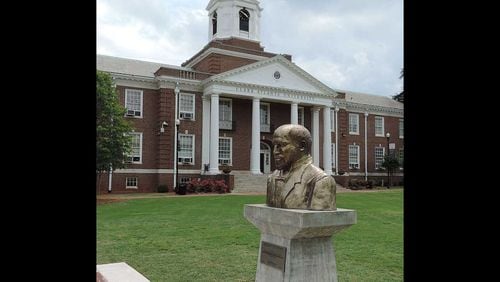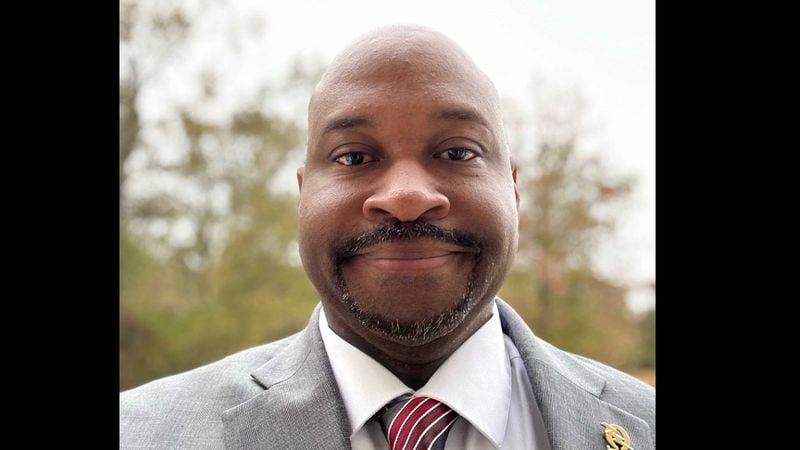W.E.B. Du Bois was the quintessential African American of the 20th Century. He was instrumental in building the civil rights infrastructure of the country through his advocacy in the Niagara Movement, a precursor to the NAACP.
From 1896 to 1913, the Atlanta University Studies, under Du Bois’s direction, produced systematic research papers focusing on the material conditions of Black folks. Topics ranged from business, education, and artistry to church, crime, family, and morality, providing direction and clarity on improving the quality of life for Black people. He established the standard for what many today would define as Black excellence.
In this esteemed tradition, the W.E.B. Du Bois Southern Center for Studies in Public Policy (Du Bois Policy Center) at Clark Atlanta University stands.
Named in honor of W.E.B. Du Bois by President George T. French in 2023, the Southern Center for Studies in Public Policy traces its origins back over half a century to its founding at Clark College in 1968. (Clark College and Atlanta University merged to become Clark Atlanta University in 1988.) Under the leadership of Bob Holmes for over 30 years, SCSPP has achieved several noteworthy research accomplishments that have impacted people of color in the South. As executive director, I stand on the shoulders of both men.
Credit: Contributed
Credit: Contributed
Continuing our commitment to empowering Black communities in the American South, we have already begun to leave a significant impact through our dedicated research and scholarly endeavors. On March 6th, we proudly hosted our inaugural Black Women in Public Policy in the South Symposium, focusing on pressing issues confronting Black women in the region, including reproductive and mental health disparities.
Looking ahead to May, we eagerly anticipate the release of our Georgia Legislative Review, wherein we will meticulously assess the voting records of all state elected officials, evaluating their impact on the quality of life for Black Georgians. In November, we will unveil our highly anticipated Status of Black Atlanta report and convene a seminar to engage stakeholders in a comprehensive discussion of our findings.
Furthermore, the Du Bois Policy Center work extends far beyond the confines of Atlanta and the American South. With an international focus, we will in 2025 produce a comprehensive examination of the Status of the Pan-African Diaspora. This ambitious undertaking seeks to assess the material conditions of Black communities and states outside the continent of Africa, shedding light on the challenges facing African-descended populations worldwide.
Understanding and documenting the Pan-African Diaspora’s status is vital for multiple reasons. It offers insights into historical and contemporary experiences, challenges, and achievements of people of African descent globally, stemming from events like the transatlantic slave trade to neocolonialism. By analyzing the socio-economic, political, and cultural circumstances, of African people outside the continent we can highlight common political, economic, social, education, and health struggles in the diaspora. A report on the Pan-African Diaspora serves as a potent tool for advocacy, policy-making, and equitable resource allocation. Additionally, it fosters solidarity among individuals and organizations dedicated to advancing the rights and well-being of people of African descent worldwide.
The Du Bois Policy Center serves as a convening place, bringing together scholars, activists, policymakers and community leaders through seminars, conferences, symposiums and training programs. These gatherings serve as crucibles of ideas and action, fostering dialogue, collaboration and collective mobilization in the pursuit of social justice and liberation. Additionally, the center seeks to catalyze transformative change at the grassroots level while informing policy decisions at the highest echelons of power.
In honoring the legacy of W.E.B. Du Bois, the Du Bois Policy Center upholds the tradition of rigorous scholarly inquiry exemplified by its namesake. Just as Du Bois spearheaded groundbreaking research through the Atlanta University Studies, we will continue to push the boundaries of knowledge, producing scholarship that illuminates the complex realities of African American life and struggles in the American and Global South.
As we navigate the challenges of the 21st century, the Du Bois Policy Center stands as a testament to the enduring relevance of W.E.B. Du Bois’s vision and legacy. In an era marked by persistent inequality and injustice, we remain steadfast in its commitment to ensuring that his vision of a better world lives on in perpetuity. Through scholarship, advocacy and action, the Du Bois Policy Center continues to practice what we call the Du Boisian continuum at Clark Atlanta University.
Joseph L. Jones is an associate professor of political science at Clark Atlanta University and the executive director of the W.E.B. Du Bois Southern Center for Studies in Public Policy.
About the Author







